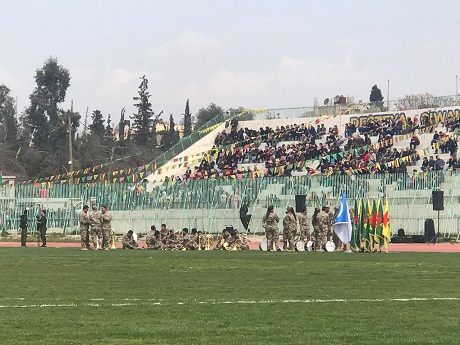A friendly football match today in the city of Qamishli, not far from the battlefield in al-Baghouz, was a reminder of a darker time 15 years ago when thousands of Kurds poured into streets of Qamishli to protest against the discriminatory policies of President Bashar al-Assad.
Unrest erupted in the city after a football match between Arab and Kurdish teams turned violent when Arab fans started displaying posters of former Iraqi dictator Saddam Hussein who committed genocide against Iraqi Kurds. The Kurds responded by displaying the Flag of Kurdistan to the irritation of the other side. Riot police and security forces were quickly deployed to curb the clashes, killing at least 30 Kurds, wounding dozens more, and forcing thousands more to flee to the Kurdistan Region.
Unlike today where much international attention is given to the Syrian Kurds who are leading an international coalition against ISIS from the ground, in those days little attention was given to the plight of the Syrian Kurds.
The predominately-Kurdish city of Qamishli hosted the match between a local team, Kurdish-favored al-Jihad, and a visiting team from the city of Deir ez-Zor, Arab-favored al-Fatwa. Six people were killed and three died in stampedes after riot police moved into the stadium to curb the clashes, according to BBC.
Events escalated the day after when security forces opened fire on people taking part in the funerals of those killed in clashes the previous day. Anger among Kurds boiled over, who soon took to the streets of Qamishli and toppled the statute of Hafez al-Assad, father of the current Syrian president. They also threw the Syrian flag raised on government buildings to the ground.
Human Rights Watch reported at least 30 people were killed, more than 160 wounded in the clashes, and many were arrested and tried by military tribunals. The unrest then spread to Damascus and Aleppo. The magnitude of the riots by Kurds was unprecedented in the history of the country. Some even refer to it as the first Kurdish uprising in Syria. Years of persecution and mistreatment by the establishment has in recent years led to the splintering of parts of the country already ravaged by internal conflict and war with ISIS into cantons run by Kurds.
Over 8,000 SDF fighters both Arabs and Kurds have been killed fighting the Islamic State since 2014.
The Syrian Kurds in their self-administered region of Rojava remembered the events of 2004 today by bashing the Baath regime of Bashar al-Assad. "On March 12, 2004, the Syrian Baath regime pursued its dirty politics against Kurdish people by committing the most heinous massacres,” said Nasrin Maami a member of Darbasya People’s Assembly in Rojava. “Its purpose was to create sedition between Syrian communities…more than 34 people were martyred and hundreds injured."
A band prepares prior to a football match between Syrian Arabs and Kurds in Qamishli on March 12, 2019. Photo: Fahad Sabri | Rudaw
In today’s match aimed to bury the dark memories of the past, the Kurdish team from Qamishli won 4-1 against the team from Deir ez-Zor at the stadium which used to be named after Bassel al-Assad, the elder brother of Bashar al-Assad who died in a car crash in 1994.
The stadium has been named after the Kurds who died during the March 2004 riots: “The Martyrs of March 12.”





Comments
Rudaw moderates all comments submitted on our website. We welcome comments which are relevant to the article and encourage further discussion about the issues that matter to you. We also welcome constructive criticism about Rudaw.
To be approved for publication, however, your comments must meet our community guidelines.
We will not tolerate the following: profanity, threats, personal attacks, vulgarity, abuse (such as sexism, racism, homophobia or xenophobia), or commercial or personal promotion.
Comments that do not meet our guidelines will be rejected. Comments are not edited – they are either approved or rejected.
Post a comment